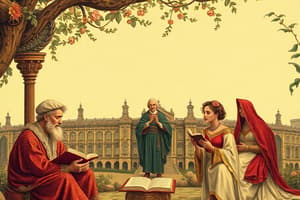Podcast
Questions and Answers
Who is considered a beacon of tragedy and comedy in Early Modern English literature?
Who is considered a beacon of tragedy and comedy in Early Modern English literature?
William Shakespeare
Which poet is associated with metaphysical poetry in the Early Modern English period?
Which poet is associated with metaphysical poetry in the Early Modern English period?
John Donne
Which novel is considered the birth of the novel in seventeenth-century English literature?
Which novel is considered the birth of the novel in seventeenth-century English literature?
Robinson Crusoe
Name a poet from the Romantic era of English literature.
Name a poet from the Romantic era of English literature.
Which author wrote timeless novels that are still studied today in English literature?
Which author wrote timeless novels that are still studied today in English literature?
What literary device is used when attributing human traits to non-human entities?
What literary device is used when attributing human traits to non-human entities?
Which literary technique involves comparing two unlike things to reveal underlying similarities?
Which literary technique involves comparing two unlike things to reveal underlying similarities?
What type of analysis focuses on the formal elements of a text, such as its structure, genre, and style?
What type of analysis focuses on the formal elements of a text, such as its structure, genre, and style?
Identify the literary device that uses objects, characters, or situations to represent abstract ideas or emotions.
Identify the literary device that uses objects, characters, or situations to represent abstract ideas or emotions.
What technique involves providing hints or clues that suggest future events or outcomes in a literary work?
What technique involves providing hints or clues that suggest future events or outcomes in a literary work?
Flashcards are hidden until you start studying
Study Notes
English: A Timeless Language of Literature
English, a global language that weaves through history, culture, and literature, has captivated readers and writers for centuries. In this exploration, we'll delve into the world of English literature and its rich tapestry.
The Evolution of English Literature
English literature's roots extend back to the Anglo-Saxon period, during which Old English texts like the Anglo-Saxon Chronicle and Beowulf were penned. As the Norman Conquest of 1066 brought French influences into the language, Middle English emerged, marked by the works of Geoffrey Chaucer, whose Canterbury Tales is a cornerstone of medieval literature.
The Renaissance ushered in Early Modern English literature, with the likes of William Shakespeare - a beacon of tragedy and comedy alike - and John Donne, a master of metaphysical poetry. Seventeenth-century English literature also witnessed the birth of the novel, with the publication of Robinson Crusoe by Daniel Defoe.
Later, Romanticism and the Victorian era produced poets such as William Wordsworth, Lord Byron, and John Keats, while Charles Dickens and Jane Austen penned timeless novels that continue to be studied today. The twentieth century brought modernism and postmodernism into the literary fold, with the works of T.S. Eliot, Virginia Woolf, and Samuel Beckett.
Literary Genres
English literature encompasses a diverse array of genres, each with its unique style, form, and purpose.
- Poetry: From the epic to the lyric, poetry has long held a special place in English literature. The works of William Blake, Elizabeth Barrett Browning, and W.B. Yeats continue to inspire readers and poets alike.
- Prose Fiction: From short stories to epic novels, English fiction has spawned some of the world's most beloved works. The novels of Jane Austen, Charlotte Bronte, and Charles Dickens are just a few examples.
- Drama: English drama is a rich and storied tradition, with the works of William Shakespeare, Christopher Marlowe, and Ben Jonson serving as enduring examples.
- Nonfiction: English literature boasts a robust collection of nonfiction texts, such as autobiographies, biographies, and travel narratives.
Literary Devices and Techniques
A well-stocked toolbox of literary devices and techniques helps writers craft memorable stories, poems, and plays. Some of the most common include:
- Metaphor: Comparing two unlike things to reveal underlying similarities or create vivid descriptions.
- Imagery: Using sensory details to evoke emotions and create vivid scenes.
- Symbolism: Using objects, characters, or situations to represent abstract ideas or emotions.
- Foreshadowing: Providing hints or clues that suggest future events or outcomes.
- Echo: Repetition of words, phrases, or ideas to create rhythm, emphasis, or irony.
- Personification: Attributing human traits or behaviors to non-human entities.
- Irony: Using words, phrases, or situations that contrast with their true meaning.
Literary Analysis and Interpretation
Understanding literature requires a combination of critical reading, analysis, and interpretation. Some common techniques include:
- Textual analysis: Examining the text itself, including its structure, language, and themes.
- Symbolic interpretation: Identifying and analyzing symbols, metaphors, and other literary devices.
- Historical and cultural analysis: Considering the context in which a work was written, including its historical and cultural influences.
- Formalist and structuralist analysis: Focusing on the text's formal elements, such as its structure, genre, and style.
English literature is a vast and ever-evolving field, full of timeless tales that inspire and challenge readers. Whether you're a student, a writer, or simply a lover of good stories, there's something for everyone in the world of English literature. "English Literature." Encyclopædia Britannica, https://www.britannica.com/art/English-literature "English Literature: A Brief History." Study.com, https://study.com/academy/lesson/english-literature-a-brief-history.html "English Literary Genres." Encyclopædia Britannica, https://www.britannica.com/art/English-literature/English-literary-genres "Literary Devices and Techniques." Encyclopædia Britannica, https://www.britannica.com/art/literary-devices-and-techniques "Literary Analysis and Interpretation." Encyclopædia Britannica, https://www.britannica.com/art/literary-analysis-and-interpretation "English Literature: Forms, Themes, and Genres." The Guardian, https://www.theguardian.com/education/2014/nov/05/english-literature-forms-themes-genres "Literary Analysis Techniques." The Writing Center at UNC Charlotte, https://writingcenter.uncc.edu/resources/literary-analysis-techniques
Studying That Suits You
Use AI to generate personalized quizzes and flashcards to suit your learning preferences.




